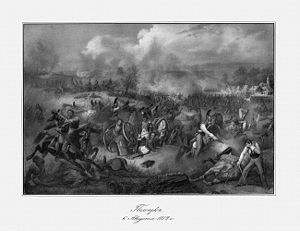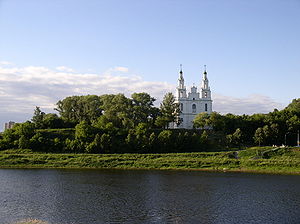
Second Battle of Polotsk
Encyclopedia
The Second Battle of Polotsk (18–20 October 1812) took place during Napoleon's invasion of Russia. In this encounter the Russians under General Peter Wittgenstein
attacked and defeated a Franco-Bavarian force under Laurent Gouvion Saint-Cyr
. In the aftermath of this success, the Russians took Polotsk and dismantled Napoleon's operations in Belarus
. Wittgenstein's victory set the stage for the Battle of Berezina
in November, in which three Russian armies converged on Napoleon from separate directions.
, was extremely important to Napoleon for several reasons.
By establishing a firm front at Polotsk, Napoleon kept Wittgenstein's command at bay. It was critical to French interests that Wittgenstein not be allowed to march south, because such an advance by the Russians would lead to Napoleon's Grande Armée, hundreds of miles to the east, being exposed to an attack in its rear while it was engaging the main Russian army near Moscow. Such a development would sever the Grande Armée's communications with Europe and it would be at risk of being encircled.
Furthermore, the French position at Polotsk was important because it served to protect Vitebsk
, which was one of three massive supply depots Napoleon had established in western part of Russian Empire (nowadays Belarus). These three supply depots—the other two being Minsk
and Smolensk—were to fuel Napoleon's war effort in the winter should the Grande Armée need to continue the campaign longer than originally anticipated.
Throughout the summer and early fall of 1812, Russians and French were stalemated at Polotsk, which meant that St. Cyr's troops were accomplishing their objective of holding the "Dwina Line". The first battle of Polotsk
, an inconclusive engagement fought in August, had the effect of keeping Wittgenstein's army at bay and was therefore considered a success by Napoleon.
By mid-October, however, the strategic balance of power at Polotsk had shifted dramatically. Wittgenstein's force had been massively reinforced and was now numerically superior to the French force it confronted.
Wittgestein at this point was in command of close to 50,000 troops. This force was composed of 31,000 regular troops and 9,000 militiamen at Polotsk itself, and a second force of 9,000 troops under General Steingal operating in the rear and flank of Polotsk.
Against this Russian juggernaut, the French under St. Cyr had no more than 23,000 to 27,000 troops. On 18 October, Wittgestein opened his offensive against the French "Dwina Line".

 On the first day of combat, the Russians made seven consecutive frontal assaults on Polotsk, while Steingal's force began advancing on the French rear. The fighting at Polotsk was torrid and bloody, with the French losing close to 8,000 troops, and the Russians suffering 8,000 to 12,000 casualties. All seven Russian attacks were beaten back by the end of the day.
On the first day of combat, the Russians made seven consecutive frontal assaults on Polotsk, while Steingal's force began advancing on the French rear. The fighting at Polotsk was torrid and bloody, with the French losing close to 8,000 troops, and the Russians suffering 8,000 to 12,000 casualties. All seven Russian attacks were beaten back by the end of the day.
St. Cyr could claim to have won round one in this bitter battle, but the affair was not over. Planning to renew his attack once Steingal's forces arrived, Wittgenstein maintained a heavy artillery bombardment of Polotsk, and before long much of the town was consumed by fire.
Late on the next day, 19 October, Steingal advanced to within four miles (6 km) of Polotsk, and St. Cyr realized he was threatened with encirclement. That night, knowing that their position was untenable, the French began evacuating Polotsk. Fierce house-to-house combat ensued in the town as the Russians launched their final attack.
Acting decisively to secure his battered forces' southern retreat route, St. Cyr ordered his Bavarian contingent to drive Steingal back early the following day, 20 October. This task was accomplished by the Bavarians impressively, as Steingal was compelled to retreat with heavy casualties. The French thus saved themselves from encirclement by the Russians, but still, the battle for Polotsk had been lost.
After three days of combat, St. Cyr's forces had been reduced to no more than 15,000 weary troops, in full retreat before Wittgenstein's 38,000 Russians. Two weeks later, Wittgenstein's troops captured the French supply depot at Vitebsk, inflicting a logistical disaster on Napoleon's fast collapsing Russian operation. Napoleon's northern front—the "Dwina Line"—was broken, and the consequences for Napoleon's Russian invasion were grim.
Peter Wittgenstein
Ludwig Adolph Peter, Prince Wittgenstein was a Russian Field Marshal distinguished for his services in the Napoleonic wars.-Life:...
attacked and defeated a Franco-Bavarian force under Laurent Gouvion Saint-Cyr
Laurent, marquis de Gouvion Saint-Cyr
Laurent de Gouvion Saint-Cyr, 1st Marquis of Gouvion-Saint-Cyr was a French commander in the French Revolutionary and Napoleonic Wars who rose to Marshal of France and Marquis...
. In the aftermath of this success, the Russians took Polotsk and dismantled Napoleon's operations in Belarus
Belarus
Belarus , officially the Republic of Belarus, is a landlocked country in Eastern Europe, bordered clockwise by Russia to the northeast, Ukraine to the south, Poland to the west, and Lithuania and Latvia to the northwest. Its capital is Minsk; other major cities include Brest, Grodno , Gomel ,...
. Wittgenstein's victory set the stage for the Battle of Berezina
Battle of Berezina
The Battle of Berezina took place November 26–29, 1812 between the French army of Napoleon, retreating after his invasion of Russia and crossing the Berezina , and the Russian armies under Mikhail Kutuzov, Peter Wittgenstein and Admiral Pavel Chichagov. The battle ended with a mixed outcome...
in November, in which three Russian armies converged on Napoleon from separate directions.
Background
While advancing on Moscow, Napoleon left a contingent of French and German troops at Polotsk to guard his northern flank against Wittgenstein. The French defensive bastion at Polotsk, alternately commanded by St. Cyr and Oudinot and located about 200 miles (321.9 km) west of the Polish border and about 150 miles (241.4 km) northwest of SmolenskSmolensk
Smolensk is a city and the administrative center of Smolensk Oblast, Russia, located on the Dnieper River. Situated west-southwest of Moscow, this walled city was destroyed several times throughout its long history since it was on the invasion routes of both Napoleon and Hitler. Today, Smolensk...
, was extremely important to Napoleon for several reasons.
By establishing a firm front at Polotsk, Napoleon kept Wittgenstein's command at bay. It was critical to French interests that Wittgenstein not be allowed to march south, because such an advance by the Russians would lead to Napoleon's Grande Armée, hundreds of miles to the east, being exposed to an attack in its rear while it was engaging the main Russian army near Moscow. Such a development would sever the Grande Armée's communications with Europe and it would be at risk of being encircled.
Furthermore, the French position at Polotsk was important because it served to protect Vitebsk
Vitebsk
Vitebsk, also known as Viciebsk or Vitsyebsk , is a city in Belarus, near the border with Russia. The capital of the Vitebsk Oblast, in 2004 it had 342,381 inhabitants, making it the country's fourth largest city...
, which was one of three massive supply depots Napoleon had established in western part of Russian Empire (nowadays Belarus). These three supply depots—the other two being Minsk
Minsk
- Ecological situation :The ecological situation is monitored by Republican Center of Radioactive and Environmental Control .During 2003–2008 the overall weight of contaminants increased from 186,000 to 247,400 tons. The change of gas as industrial fuel to mazut for financial reasons has worsened...
and Smolensk—were to fuel Napoleon's war effort in the winter should the Grande Armée need to continue the campaign longer than originally anticipated.
Throughout the summer and early fall of 1812, Russians and French were stalemated at Polotsk, which meant that St. Cyr's troops were accomplishing their objective of holding the "Dwina Line". The first battle of Polotsk
First battle of Polotsk
In the First battle of Polotsk, which took place on 17–18 August 1812, Russian troops under the command of Peter Wittgenstein fought French and Bavarian troops led by Nicolas Oudinot and stopped their advance to Saint Petersburg...
, an inconclusive engagement fought in August, had the effect of keeping Wittgenstein's army at bay and was therefore considered a success by Napoleon.
By mid-October, however, the strategic balance of power at Polotsk had shifted dramatically. Wittgenstein's force had been massively reinforced and was now numerically superior to the French force it confronted.
Wittgestein at this point was in command of close to 50,000 troops. This force was composed of 31,000 regular troops and 9,000 militiamen at Polotsk itself, and a second force of 9,000 troops under General Steingal operating in the rear and flank of Polotsk.
Against this Russian juggernaut, the French under St. Cyr had no more than 23,000 to 27,000 troops. On 18 October, Wittgestein opened his offensive against the French "Dwina Line".
Action


St. Cyr could claim to have won round one in this bitter battle, but the affair was not over. Planning to renew his attack once Steingal's forces arrived, Wittgenstein maintained a heavy artillery bombardment of Polotsk, and before long much of the town was consumed by fire.
Late on the next day, 19 October, Steingal advanced to within four miles (6 km) of Polotsk, and St. Cyr realized he was threatened with encirclement. That night, knowing that their position was untenable, the French began evacuating Polotsk. Fierce house-to-house combat ensued in the town as the Russians launched their final attack.
Acting decisively to secure his battered forces' southern retreat route, St. Cyr ordered his Bavarian contingent to drive Steingal back early the following day, 20 October. This task was accomplished by the Bavarians impressively, as Steingal was compelled to retreat with heavy casualties. The French thus saved themselves from encirclement by the Russians, but still, the battle for Polotsk had been lost.
After three days of combat, St. Cyr's forces had been reduced to no more than 15,000 weary troops, in full retreat before Wittgenstein's 38,000 Russians. Two weeks later, Wittgenstein's troops captured the French supply depot at Vitebsk, inflicting a logistical disaster on Napoleon's fast collapsing Russian operation. Napoleon's northern front—the "Dwina Line"—was broken, and the consequences for Napoleon's Russian invasion were grim.

